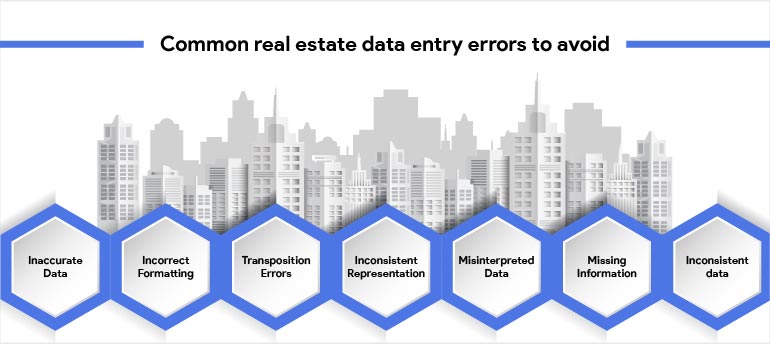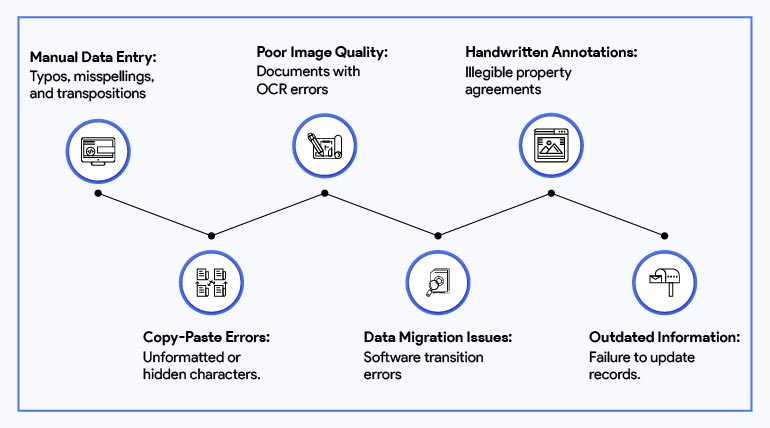10 Powerful eCommerce Data Collection Strategies & Examples
In the dynamic world of real estate, data serves as the backbone of informed decision-making, guiding everything from property valuations to market trend predictions. The accuracy of this data is paramount, as even minor discrepancies cost real estate companies millions of dollars and misinformed strategies.
Vast volumes of complex data and multilingual information make the real estate industry immune to data entry errors. These errors stem from simple human mistakes to complex system malfunctions.
Table of Contents
Zillow’s home-buying algorithm disaster is a classic example of the costly impact of data entry errors. The median error resulted in Zillow purchasing 27,000 homes at prices that were not sustainable. Their algorithm, designed to make cash offers on properties, suffered from an error that made the company write off millions of dollars and slash its workforce.
In this blog, we will probe the cost of data entry errors in real estate, which can range from financial losses and legal disputes to misinformed decisions, compliance issues and a tarnished reputation. We will also discuss the solutions.
Data entry errors are common in the real estate industry and can have significant impacts on business operations, revenue, and legal compliance. These errors can be broadly categorized into several types:

Want to fix data entry errors in your real estate data?
Quantifying the impact of data entry errors in the real estate industry reveals a concerning picture, with significant financial, legal, and operational repercussions. While specific statistics can vary widely depending on the source and the market segment, several industry reports and analyses provide insight into the magnitude of these impacts:
These statistics and reports highlight the critical importance of accurate data management in the real estate industry, highlighting the need for robust systems and processes to mitigate the risk of data entry errors.
Data entry errors can creep into real estate documents through various means and processes. It could stem from typos, communication breakdowns, software glitches and data mishandling, undermining transaction accuracy.
Some common sources of data entry errors in real estate documents include:

A third of the industry still uses manual workflows to manage title and deed data and struggles to resolve issues of property address mismatch, differing listing contract dates, mismatch in parcel numbers, etc.
Here are some real-life examples how data entry errors cost millions of dollars and tarnished reputation:
Scenario: A data entry error made to the automated computing algorithm designed to make cash offers on properties.
Consequences: Data error resulted in Zillow purchasing 27,000 homes at prices that were not sustainable. The leading real estate company had to write off $569 million worth of homes and lay off 25% of its staff to compensate for the impact on its business.
Scenario: The amount of $793,595 was hidden in rows in the spreadsheets due to manual operating error while filing tax returns.
Consequences: A cashier was charged with first-degree theft, money laundering and 19 counts of filing false or fraudulent tax returns with the state Department of Revenue. He was accused of stealing the funds by exchanging checks for real estate excise taxes with money from the office’s cash drawer.
Scenario: Last-minute billing adjustments by City council staff mistakenly overcharged 3,000 customers.
Consequences: The total error resulted in net refunds of $16,276 to district customers through recalculated property tax bills. The number adjusted is relatively a very small number of underpayments processed for thousands of customers.
Scenario: $20 million theft from a top real estate firm and key witness died.
Consequences: Authorities announced arrests in the theft of $20 million from America’s largest commercial-real-estate company. The officials discovered only $4 million, rest of the money is missing and the lead witness in the case died.
Scenario: County tax assessor’s office missed assessing 25,000 acres of oil fields.
Consequences: The mistake on a clerical error by an experienced staffer who used the wrong spreadsheet to calculate missed out on annual revenue worth $12 million.
These examples underscore the critical importance of accurate data entry in the real estate industry and the potentially devastating financial consequences of errors. Manual document preparation, routing, processing, indexing, and filing contribute to shockingly high data inaccuracies.
To mitigate these types of data entry errors, real estate professionals often implement quality control measures, use specialized software, and provide training to personnel involved in data entry. Regular data validation and verification are also essential to catch and correct errors before they lead to significant problems in a transaction.
Real estate data entry can be a complex and detail-oriented task. Here are some techniques and examples to help ensure accurate and efficient real estate data entry:
Use Data Entry Templates – Create standardized templates for different types of real estate data, such as property listings, client information, or rental agreements.
Example – For property listings, create a template that includes fields for property type, address, square footage, number of bedrooms, bathrooms, and so on.
Auto-Fill and Drop-Down Menus – Implement auto-fill and drop-down menus in your data entry software to minimize manual typing and ensure consistency.
Example – When entering property locations, provide a drop-down menu of predefined neighborhoods or cities to choose from.
Data Validation Rules – Set up data validation rules to restrict the type of information that can be entered into specific fields.
Example – Validate phone numbers to ensure they follow a specific format, such as (123) 456-7890.
Auto-Capitalization and Formatting – Set up rules for auto-capitalization and formatting to maintain consistency in data presentation.
Example – Automatically capitalize the first letter of each word in property descriptions to ensure professional-looking listings.
Error Checking and Alerts – use double -keying data entry method and implement error-checking algorithms to identify and flag data entry errors in real time.
Example: If a user attempts to enter a property with an invalid ZIP code, the system can provide an alert and suggest corrections.
These techniques, when applied appropriately, can streamline real estate data entry processes, reduce errors, and improve the overall quality and accuracy of your real estate database. Choose the techniques that best fit your specific needs and workflows. Multiple techniques with macros and defined rules helped a listing site with accurate property data.
The impact of data entry errors in the real estate sector goes beyond numerical mistakes. These errors damage the essence of property transactions, leading to financial losses, legal complications, and damaged relationships and reputations. The need for accuracy in data management is crucial for the industry. Real estate companies should implement stringent quality control measures, leverage advanced technologies, and adopt a culture of accuracy to counter the adverse effects of data entry mistakes.
By doing so, they can enhance their financial resilience, ensure legal compliance, and most importantly, continue the trust and loyalty of their clients. In the real estate domain, value is not only measured in monetary terms but also in the accuracy and clarity of the data that drives the industry. For cost-effective and efficient solutions, companies must consider outsourcing real estate data entry tasks, which allows them to tap into specialized expertise, streamline operations, and focus on core real estate activities while minimizing the risk of data entry errors.
What’s next? Message us a brief description of your project.
Our experts will review and get back to you within one business day with free consultation for successful implementation.
Disclaimer:
HitechDigital Solutions LLP and Hitech BPO will never ask for money or commission to offer jobs or projects. In the event you are contacted by any person with job offer in our companies, please reach out to us at info@hitechbpo.com
Leave a Reply